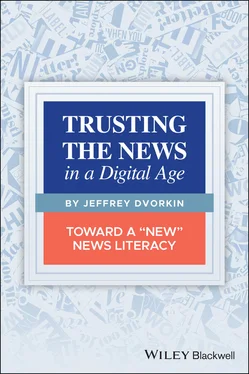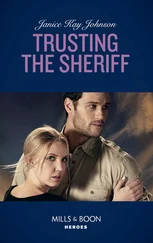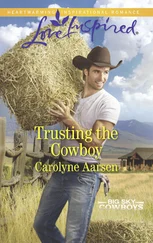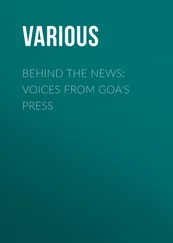Jeffrey Dvorkin - Trusting the News in a Digital Age
Здесь есть возможность читать онлайн «Jeffrey Dvorkin - Trusting the News in a Digital Age» — ознакомительный отрывок электронной книги совершенно бесплатно, а после прочтения отрывка купить полную версию. В некоторых случаях можно слушать аудио, скачать через торрент в формате fb2 и присутствует краткое содержание. Жанр: unrecognised, на английском языке. Описание произведения, (предисловие) а так же отзывы посетителей доступны на портале библиотеки ЛибКат.
- Название:Trusting the News in a Digital Age
- Автор:
- Жанр:
- Год:неизвестен
- ISBN:нет данных
- Рейтинг книги:4 / 5. Голосов: 1
-
Избранное:Добавить в избранное
- Отзывы:
-
Ваша оценка:
- 80
- 1
- 2
- 3
- 4
- 5
Trusting the News in a Digital Age: краткое содержание, описание и аннотация
Предлагаем к чтению аннотацию, описание, краткое содержание или предисловие (зависит от того, что написал сам автор книги «Trusting the News in a Digital Age»). Если вы не нашли необходимую информацию о книге — напишите в комментариях, мы постараемся отыскать её.
How to use critical thinking to discern real news from fake news in a Digital Age
Trusting the News in a Digital Age
Trusting the News in a Digital Age
Trusting the News in the Digital Age
Trusting the News in a Digital Age — читать онлайн ознакомительный отрывок
Ниже представлен текст книги, разбитый по страницам. Система сохранения места последней прочитанной страницы, позволяет с удобством читать онлайн бесплатно книгу «Trusting the News in a Digital Age», без необходимости каждый раз заново искать на чём Вы остановились. Поставьте закладку, и сможете в любой момент перейти на страницу, на которой закончили чтение.
Интервал:
Закладка:
The Appeal of News Literacy
News literacy is the best way to think about and respond to all the media choices that are available. News literacy is a tool we can use to sharpen our instincts about the news and to sort out the important from the merely interesting. Most of all, news literacy is about sustaining our democratic values by questioning what we consume via various media outlets.
This is not to say that we need to be overly suspicious or cynical. But in this digital food court, not everything on offer is worth consuming. We need to choose wisely. That doesn't mean that our news diet will be exclusively of kale, quinoa, and broccoli. We will need some sweets along the way. Just not perhaps as a main course…
“How Do We Know?”
How do we know what we know? Just because it’s in a newspaper or on a website, does that mean it’s true? Where does this information come from? Is it reliable or merely a bit of unsubstantiated gossip? Why should we trust this information? And what might happen if we don’t ask skeptical and tough questions?
This is what journalists and informed citizens need to ask, both of themselves and of the people who are providing the information. We need to demand that our media be more transparent. This means asking news sources to be open with the public about where the stories are originating, who the sources of information are, and, if the sources can't be identified, why.
We need to question how reporters got their story, who gave it to them, how it was presented, and why it was presented in the form it was presented in. We especially must focus on the why of the famous “who, what, when, where, how, and why” rule of journalism
The Five Ws,are questions whose answers are considered basic in information‐gathering. They include: who, what, when, where, and why. The Five Ws are often mentioned in journalism research and police investigations. They constitute a formula for getting the complete story on a subject. According to the principle of the Five Ws, a report can only be considered complete if it answers these questions starting with an interrogative word: [3]
Who is it about?
What happened?
When did it take place?
Where did it take place?
Why did it happen?
But in the digital age, when the origin of the information may be less evident, we still need to ask an “H” question: “How Do We Know?” This is a more complicated but even more essential question which relates to how news organizations are able or willing to show how a story is reported. This is called media accountability.
Media accountability is an essential requirement, especially with digital media.
Accountability, like transparency, is about acknowledging ownership of the reporting. It allows the public to connect with the news organization directly. This has been done through the comments section found at the close of a report posted online and via letters to the editor in daily newspapers. These allow news organizations to give the public a way to comment on the value of the reporting. It also gives the editors a sense of what works for and with the public. It also gives a sense of interactivity or a connection with the audience. The question is whether this is just a gesture on the part of the news organization, or if it is an effective approach to connecting with the public in this digital era.
Similarly, the role of a public editor, or news ombudsman, has been useful in creating a way in which news consumers can express their opinions and file a complaint about specific coverage. The changing role of the audience as both participant and observer of the news in the digital environment will also be explored in this book.
In the digital era, the news is everywhere. We see headlines on a TV screen or on a front page. We may have a good sense of what is going on even if we don't know the details. Of the Five Ws, we sometimes don't know the “why” of the news. Why did something happen, and what are the implications? In 2006, Bill McKibben wrote about the “Age of Missing Information” in a book of the same title. McKibben watched an entire day's worth of television and subjected himself to this sensory overload in an experiment to verify whether we are truly better informed than previous generations. He concluded that without the “why” of news (also known as putting the story in context), he was less well‐informed than if he hadn’t watched TV at all.
Since then, it seems that the issues outlined by McKibben have worsened. News literacy gives us the tools to make sure that if information is hidden, we can know how to find it and why it may have been hidden in the first place.
From the late nineteenth century through 2008, the City News Bureau was an essential part of Chicago's local news landscape. It was the legendary basis for all the news that found its way into Chicago newspapers, radio, and television newscasts. It even had its own motto: “If your mother says she loves you, check it out!”
A motto for all journalists and news consumers, especially these days…
The Promises and Dangers of the Internet
That's because of this relatively new invention, called the Internet – the global network of networks that is accessed via the World Wide Web.
It is hard to imagine a time when we were not as closely‐linked to all things online as we are now. The rapid changes in the digital world are constant, and we need to develop a good grasp of what is bombarding us on a moment‐by‐moment basis. Essential in this process is a more nimble (and more water‐proof) craft to help us navigate these informational rapids!
In fact, it wasn't until US President George W. Bush left office in 2008 and President Barack Obama took office that the informational landscape was shaken up and changed forever by the arrival of mobile applications – known as “apps” – like Facebook, Twitter, and Snapchat. Apps are downloadable programs designed originally for use on mobile phones.
Email once seemed like the ultimate and essential communication platform when it burst onto the scene in the mid‐1990s. But it is now, for many people, completely outmoded. Younger media consumers prefer to text using completely different platforms and apps, thus avoiding email entirely.
As a result of this digital transfusion, we are now in an era where we may try our best to stay tuned into, keep on top of, and make sense of the world. But this often eludes many of us. Our feeble attempts to know what's going on at all times has been compared to trying to take a sip of water from a fire hose! There is even an acronym for this state of “information anxiety”: FOMO – fear of missing out!
Complicating this is the insertion of an inevitable commercial presence into the Internet. Opportunities for monetizing the Internet abound. Digital giants such as the “Big Five” – Facebook, Apple, Amazon, Microsoft, and Google – are now able to keep tabs on what we view, download, and share. Any time we download another app or computer game or order something online, the server on whose site we are doing this knows what we have done. That information is harvested and sold to others who want to know what interests us. We will look more closely at the influence of the “Big Five” in Chapter 8.
We are complicit in this, in part because we have little choice. We want access to the information. But in clicking “I agree” on a site, we surrender and tacitly agree to give to these giants knowledge about ourselves, along with our buying and viewing habits, in exchange for access to the Web. This information is known as metadata.
This metadata is efficiently gathered and analyzed by tech companies. It allows the companies to track our patterns so that our digital lives become known, even transparent. This information can be sold or shared with other commercial and governmental interests – so our presence on the Web now has monetary value. It is another nail in the coffin of the concept of a private life. Every time we go online, send a message, or purchase something on the Internet, there is a media organization that knows all about us, our needs, and our presence in the marketplace. For most people, this seems like a reasonable exchange. So far. But increasingly, doubts are emerging, and the role of these giant Internet companies is being questioned, especially by European regulators.
Читать дальшеИнтервал:
Закладка:
Похожие книги на «Trusting the News in a Digital Age»
Представляем Вашему вниманию похожие книги на «Trusting the News in a Digital Age» списком для выбора. Мы отобрали схожую по названию и смыслу литературу в надежде предоставить читателям больше вариантов отыскать новые, интересные, ещё непрочитанные произведения.
Обсуждение, отзывы о книге «Trusting the News in a Digital Age» и просто собственные мнения читателей. Оставьте ваши комментарии, напишите, что Вы думаете о произведении, его смысле или главных героях. Укажите что конкретно понравилось, а что нет, и почему Вы так считаете.












